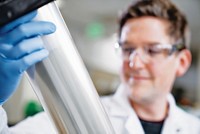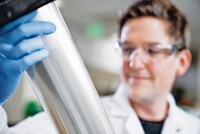Advertisement
Grab your lab coat. Let's get started
Welcome!
Welcome!
Create an account below to get 6 C&EN articles per month, receive newsletters and more - all free.
It seems this is your first time logging in online. Please enter the following information to continue.
As an ACS member you automatically get access to this site. All we need is few more details to create your reading experience.
Not you? Sign in with a different account.
Not you? Sign in with a different account.
ERROR 1
ERROR 1
ERROR 2
ERROR 2
ERROR 2
ERROR 2
ERROR 2
Password and Confirm password must match.
If you have an ACS member number, please enter it here so we can link this account to your membership. (optional)
ERROR 2
ACS values your privacy. By submitting your information, you are gaining access to C&EN and subscribing to our weekly newsletter. We use the information you provide to make your reading experience better, and we will never sell your data to third party members.
Biobased Chemicals
Zymergen rakes in $400 million for engineered microbes
Bay-area start-up uses custom software, lab automation to improve fermentation
by Melody M. Bomgardner
December 14, 2018

Zymergen, an automation-focused microbe engineering start-up, has raised $400 million in its third round of funding from SoftBank Vision Fund, Goldman Sachs, Hanwha Asset Management, and other investors.
Founded in 2013 and based in Emeryville, California, Zymergen has now raised $574 million for its microbe-engineering platform—a large amount for technology that has yet to see commensurate commercial success.
The company serves corporate customers that make products via industrial biotechnology. It uses synthetic biology to design fermentation organisms—bacteria, yeasts, and fungi—that perform well in large manufacturing facilities. Zymergen’s customers make ingredients used in agriculture, consumer goods, food, fragrances, and personal care.
For more than a decade, start-ups have promised that microbes can manufacture commercially-important chemicals from sugar, and make them more sustainable or less costly than those synthesized from petroleum. But most such firms were brought down by long R&D timelines, expensive manufacturing efforts, competition from cheap petrochemicals, and huge debt loads.
Zymergen focuses on making high-performance microbes, not downstream products. It has invested in custom software, lab robots, and machine-learning algorithms for high-throughput experimentation and analysis. Rather than work on one microbe or chemical at a time, it pursues thousands of experiments in parallel. The company is mum on who its customers are but says it gets paid based on the value its improved microbes create.
This microbe-engineering service model has also brought investors to Boston-based Ginkgo Bioworks. Ginkgo has raised $429 million and built four organism “foundries” where it designs microbes for customers, including flavor and fragrance firms.
Zymergen’s chief commercial officer, Tom Stephenson, says the model works. “Our customers have products shipping at hundreds of thousands of metric tons. We’ve proven that the microbes we’ve improved are working in the factory.” He adds that investors like its slate of “blue chip” customers as well as its pipeline of contracted projects.
Zymergen will use the funds to invest in more software, robots, and analytical equipment. Earlier this year, it acquired Radiant Genomics, a functional metagenomics-research firm. Access to genome libraries will help Zymergen work on its own discovery projects, Stephenson says. One example is a bio-inspired repellent for mosquitoes and ticks.
It will be necessary for Zymergen to seek new markets to support the large investment it has raised, points out Gihan Hewage, an analyst at Lux Research. “The current model will not justify all of the valuation,” he warns.
Other companies have run into problems selling new-to-the-world molecules. Hewage says Zymergen has the capability to craft microbes that can make new molecules to fulfill known market needs. But it will take a long time to design, market, and profit from them, he warns, and that could mean a risky bet for investors.




Join the conversation
Contact the reporter
Submit a Letter to the Editor for publication
Engage with us on Twitter